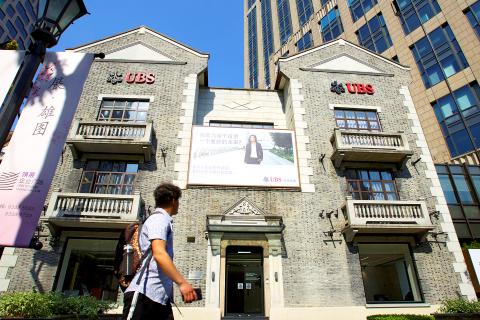UBS AG has lost a lead role on a US dollar bond deal for state-backed China Railway Construction Corp (CRCC, 中國鐵建), just days after a Chinese outcry over a senior UBS economist’s use of “pig” in connection with Chinese food price inflation.
While UBS apologized for the remark on Thursday and put the analyst on leave on Friday, the furor led Haitong International Securities (海通國際證券), a leading Chinese brokerage, to suspend all business with the Swiss group as some Chinese bankers and analysts criticized the bank for a lack of cultural awareness.
Yesterday, a spokesman at Chinese infrastructure giant CRCC that confirmed it had dropped the Swiss banking giant from the deal, but did not give a reason.

Photo: Reuters
The decision was taken because of the controversy over the pig comment, according to a source at the bank, who declined to be named as he was not authorized to talk to media.
A UBS spokesman declined to comment.
The upset stemmed from a remark by Paul Donovan, global chief economist at UBS’ wealth management business since 2016, in a podcast on Wednesday, which was then transcribed and posted on the bank’s Web site. It has since been taken down.
In the podcast, Donovan said that consumer prices in China had risen mainly due to sickness among pigs.
“Does this matter? It matters if you are a Chinese pig. It matters if you like eating pork in China,” Donovan said in comments some took offense at because of a perceived reference to people, not livestock.
The fierce outcry has taken many other Western banks by surprise.
In at least two Wall Street institutions bankers said their colleagues were discussing which words they should avoid following the UBS pig furore.
UBS analysts have also been asked informally by managers to be very careful about the use of words when referring to China or Chinese entities, sources with knowledge said.
“One of our economists came to me and asked me if we should prepare a list of words that we should always avoid mentioning in China-related reports. I thought he was joking, but he was serious,” one senior banker said.
The row came as global investment banks are gearing up for a push into China following rule changes that allow them to control their securities joint ventures.
UBS was the first in November last year to win approval under the rule changes. In March, JPMorgan Chase & Co and Japan’s Nomura Holdings Inc also got the nod.
“You can’t ignore the timing of this controversy — foreign brokerages are looking for a bigger footprint in China and the local houses are beginning to get worried about the impact of that on their market share. So they are not going to miss any excuse to go after the foreigners,” said a banker whose employer has been approved for 51 percent control.

CHIP WAR: Tariffs on Taiwanese chips would prompt companies to move their factories, but not necessarily to the US, unleashing a ‘global cross-sector tariff war’ US President Donald Trump would “shoot himself in the foot” if he follows through on his recent pledge to impose higher tariffs on Taiwanese and other foreign semiconductors entering the US, analysts said. Trump’s plans to raise tariffs on chips manufactured in Taiwan to as high as 100 percent would backfire, macroeconomist Henry Wu (吳嘉隆) said. He would “shoot himself in the foot,” Wu said on Saturday, as such economic measures would lead Taiwanese chip suppliers to pass on additional costs to their US clients and consumers, and ultimately cause another wave of inflation. Trump has claimed that Taiwan took up to

A start-up in Mexico is trying to help get a handle on one coastal city’s plastic waste problem by converting it into gasoline, diesel and other fuels. With less than 10 percent of the world’s plastics being recycled, Petgas’ idea is that rather than letting discarded plastic become waste, it can become productive again as fuel. Petgas developed a machine in the port city of Boca del Rio that uses pyrolysis, a thermodynamic process that heats plastics in the absence of oxygen, breaking it down to produce gasoline, diesel, kerosene, paraffin and coke. Petgas chief technology officer Carlos Parraguirre Diaz said that in

Japan intends to closely monitor the impact on its currency of US President Donald Trump’s new tariffs and is worried about the international fallout from the trade imposts, Japanese Minister of Finance Katsunobu Kato said. “We need to carefully see how the exchange rate and other factors will be affected and what form US monetary policy will take in the future,” Kato said yesterday in an interview with Fuji Television. Japan is very concerned about how the tariffs might impact the global economy, he added. Kato spoke as nations and firms brace for potential repercussions after Trump unleashed the first salvo of

SUBSIDIES: The nominee for commerce secretary indicated the Trump administration wants to put its stamp on the plan, but not unravel it entirely US President Donald Trump’s pick to lead the agency in charge of a US$52 billion semiconductor subsidy program declined to give it unqualified support, raising questions about the disbursement of funds to companies like Intel Corp and Taiwan Semiconductor Manufacturing Co (台積電). “I can’t say that I can honor something I haven’t read,” Howard Lutnick, Trump’s nominee for commerce secretary, said of the binding CHIPS and Science Act awards in a confirmation hearing on Wednesday. “To the extent monies have been disbursed, I would commit to rigorously enforcing documents that have been signed by those companies to make sure we get